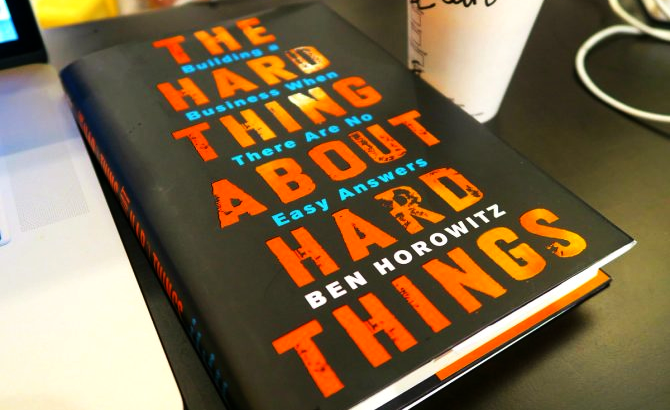The Hard Thing About Hard Things - Book Review
If there's one feeling that you will be left with after reading Ben Horowitz's 'The Hard Thing About Hard Things' is that you'd be kicking yourself for not having read it earlier. In my opinion, it is the definitive guide to doing business whether you're an entrepreneur, a sales guy, a product manager or a team leader in any department.
Image picked up from Google image search
One of the primary motivations for me to pick up 'The Hard Thing about Hard Things' is the essay titled 'Good Product Manager, Bad Product Manager'. This was first featured in the book and has been widely touted as a 101 reading for all aspiring product managers. And rightfully so. I had read that essay a couple of years ago and it outlines the qualities of good product managers and how most fall into the trap of certain bad habits. It's essentially a list of dos and don'ts. A good product manager makes a team a winning one, whereas a bad product manager creates negative value for the team. The essay can be read here.
But moving on to the book on the whole, it was an easy read. I suspect this would even be entertaining for a reader if s/he is not well versed with business jargon. Each chapter comprises of the choicest anecdotes from Ben's expansive career from Netscape to Loudcloud to Opsware to HP and finally a16z. All of these stories, if not relatable, will evoke a sense of empathy with Ben's narration. I love the honesty and the struggle behind each of the big decisions Ben, as an entrepreneur, had to make.
'The Hard Thing About Hard Things' succeeds like no other business book because it embraces failures while instilling advice and leaving you with memorable takeaways. Sure, what you may face as a future entrepreneur may or may not mirror Ben's or Marc's (Andreessen) struggles but the learnings are timeless and many of them can be applied in different scenarios. For example, no matter what team you lead, your team members will have the base expectation of you not bullshitting them. Many team leads and CEOs fall prey to this. This is one of the basic principles that is hammered to the reader with many of the stories. Some of the other key lessons that Ben talks about is going against the grain of the executive management or board members. Important decisions often get swayed by group-think or risk-averseness. It's your job as a CEO/manager to champion the tough decisions especially when you have corroborating evidence of a positive hypothesis, whether data leads you that way or it's customer feedback or market research, what have you.
As you progress through the book, you will realize that Ben's narration pretty much covers the major events in the life cycle of a company. Some of those are:
Working in a startup and scaling it
Product - Market fit
Fending off competition from incumbents
Excelling at sales
Knowing the true value of your company/product
People management as your company scales
Knowing when to go public with your company
Knowing when to get acquired
One criticism that this book faces is that most of the stories predate the current millennial-tech-ecosystem. Okay that's not really a thing (or is it?). But I hope you get my drift. The companies mentioned in examples by Ben aren't glamorous but they're hardcore businesses which survived the 2000 dot-com bubble, made hundreds of millions of dollars and one even being valued at $1.6 billion dollars in the mid 2000s. If those aren't great benchmarks, I don't know what are. Just because a Snapchat may have a completely different model, doesn't mean that their teams don't struggle with sales or people problems. A lot of the learning in this book stems from principles of doing business and handling situations.
The Hard Thing About Hard Things is not an entrepreneur's playbook to success but it's a warning to that lot that...well...shit happens! And when you realize that you've been dealt a bad hand, Ben proves that there are still ways to maneuver through them and come out standing. It's a book to be re-read multiple times!
I'm going to wrap this up by quoting some of my favorite lines from the book. There are many to choose from but these quotes were an instant home-run for me and they left me nodding profusely in agreement.
"Note to self: It’s a good idea to ask, “What am I not doing?"
"Take care of the People, the Products and the Profits - In that order."
"If you're going to eat shit, don't nibble!"
"A healthy company culture encourages people to share bad news. A company that discusses its problems freely and openly can quickly solve them. A company that covers up its problems frustrates everyone involved."
"Having dogs at work and yoga aren't culture!"
